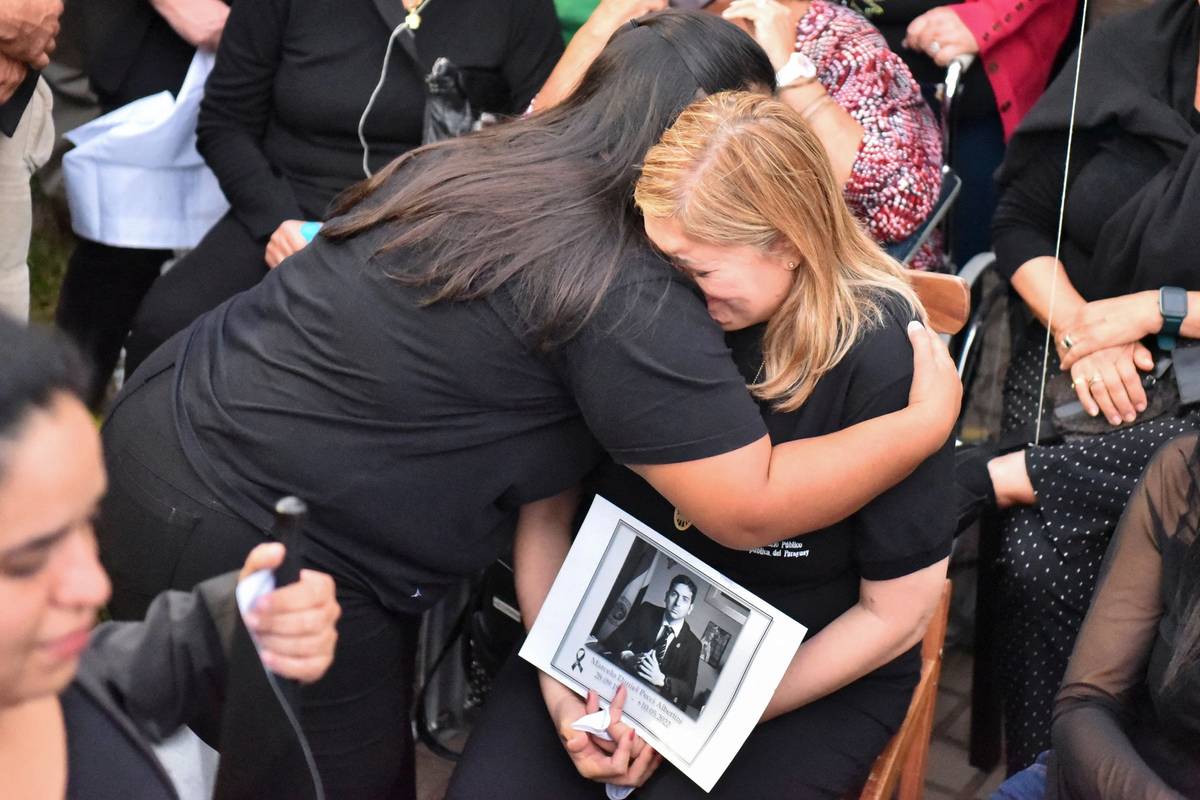Murder on the Beach
Paraguay’s slain criminal prosecutor Marcelo Pecci made many enemies in his lifelong effort to protect the rule of law. One of them was Hezbollah.




Paraguay’s criminal prosecutor Marcelo Pecci was a quiet man with a humble demeanor. He spoke sparingly and did not seek the limelight. He was also courageous. As a high-profile member of the Office of Public Prosecution, he led Paraguay’s anti-narcotics, corruption, organized crime, and terrorism finance investigations, prosecuting the most powerful criminal networks in his country. He believed in what he did, and he did it well.
In recent years, Paraguay has become a key transit hub for increasingly larger quantities of cocaine. Foreign crime syndicates have moved in, both to work with and compete against local networks. As if that were not enough, much of Paraguay’s political class is in bed with the narcos—Paraguay ranks among the most corrupt in the region. Politicians who do not take corruption money from foreign crime syndicates often run their own illicit businesses, such as large-scale cigarette smuggling and local marijuana production. Their crime generates more crime. Proceeds from the illicit economy are estimated to be between a quarter and half of the country’s GDP.
At age 45, Marcelo was a rising star and a serious contender to become the next attorney general of Paraguay. That made him even more dangerous to all whose interests he threatened with his investigations. And they were many. Marcelo’s cases put jacks of all illicit trade under lock and key, making powerful enemies along the way. He inhabited a cruel world. His enemies were the enemies of the rule of law, transparency, good governance, and public integrity: mafias, terror finance networks, and the corrupt politicians who sold their souls and the future of their country to transnational crime. Marcelo must have known the risks, but rejected the lure of a lavish life bought at the price of cowardice. He was incorruptible.
Eventually, last week, they came for him.
Marcelo had flown to Colombia a few days earlier with his newly wedded wife, to spend their honeymoon at the Isla Barú Decameron Hotel, an exclusive, secluded resort on Colombia’s Caribbean coast, near Cartagena. There, the happy couple announced on social media that they were expecting. But their child will never meet his father. On May 10, the last day of their honeymoon, as the couple was lounging on a private beach, two assassins rode a rented jet ski to the shore, dismounted, approached Marcelo, and shot him three times in front of his wife. The first shot was to the mouth—a clear message that he was being punished for not keeping it shut, and the signature of a skilled marksman, even at close range. Within seconds, as Marcelo lay dying on the sand, the hitmen took off, returned their rental, and vanished into thin air, likely aided by accomplices who were waiting to extract them by land. It reportedly took 16 minutes from the moment they rented the jet ski to the time they returned it. By the time police cordoned off the area, Marcelo’s murderers were long gone.
Marcelo’s enemies all had the means and the motives to kill him in Paraguay. Going after him in a foreign country is a different story. That required a high level of intelligence, logistical planning, and execution. Murdering Marcelo required significant amounts of planning, intelligence gathering, and monitoring before the hitmen hired for the job could carry out an operation as swiftly and accurately as they did. By Colombian standards, Isla Barú is a very safe place. Knowing where he was and when—at a precise spot on the beach, rather than in his room, the gym, the pool, the restaurant, or the bar—required local, real-time, human intelligence.
And while details are still emerging, only three categories of suspects fit the bill for such a complex operation: a state actor, a transnational criminal organization, or a terrorist organization. In the words of Colombia’s director of national police, Jorge Luis Vargas, those who ordered Marcelo’s murder are linked to either “international radical terrorism” or narcotraffic. Yet those categories are not mutually exclusive.

Marcelo was murdered by an assassin who likely wanted to derail his efforts, grant impunity to those who hired him, and ensure no one would pick up the pieces he left behind. His death made front page news across the globe, in ways he might not have expected when he was still alive. He did not see himself as a larger-than-life hero—just a civil servant, performing his duty. The outcry is well-deserved, because every one of the cases he investigated and prosecuted has global repercussions. The dramatic spike in cocaine flows transiting Paraguay is heading to Europe. The money laundered for Hezbollah fuels conflict in the Middle East. The weapons smuggled into Paraguay arm regional gangs and cartels inside and beyond its borders. The spiral of violence fed by the increasing presence of criminal syndicates in the country spills over to neighbors, in a downward spiral that is corroding the rule of law, governance, and public safety across the entire Latin American continent.
Marcelo disrupted operations of transnational criminal organizations operating inside his country, which include Latin American, European, Asian, and Middle Eastern crime syndicates. And he poked terror finance networks linked to Hezbollah, whose agents have used Paraguay for decades to self-fund through criminal joint ventures with the cartels. All bad actors in Paraguay have bought influence and impunity from the local political cupola, with lavish bribes. Any one of them, or a joint venture between them, could very well be the culprit.
Where there is organized crime there is money laundering, and for decades, Hezbollah has been a key financial service provider to crime syndicates across Latin America. It operates in multiple locations, with Colombia being a historic hub of cooperation with organized crime. But its facilitators also operate along all of Paraguay’s frontiers, mostly in the Tri-Border Area, or TBA, a riverine junction of the Parana and Iguazu rivers, which naturally separates the countries of Argentina, Brazil, and Paraguay. Hezbollah’s regional headquarters are in the large metropolitan area that sits astride the frontier. The TBA is a magnet for all criminals: More than a pirate island offering a haven to fugitives, it is a global hub for money laundering. Money has no political connotation—criminals need to launder it and shop for the best service providers. Hezbollah financiers are the best in the trade, and have an ecumenical approach to working with infidels. Money, after all, has no odor, as the old Latin proverb says.
Marcelo’s targets in recent years were increasingly located in the TBA, Paraguay’s criminal hotspot. Historically, the TBA has been the regional hub of contraband and money laundering on a large scale for organized crime as well as for terror groups, especially Hezbollah. That is what makes it a key suspect.
Hezbollah and Iranian agents have been in Colombia for years. Iran’s influence networks have an established presence not only in Bogotá, but also in other parts of the country, where they recruit and radicalize locals through Iranian-controlled mosques and cultural centers. Their influence operation is run by a proxy of Iran’s Revolutionary Guard Corps, the U.S.-sanctioned Al Mustafa International University. Hezbollah has also been there for a long time, leveraging local Lebanese Shia expatriates to launder money on behalf of drug cartels. Their proceeds help Hezbollah self-fund over and above Iranian direct contributions. The combination of Iranian and Hezbollah networks creates a perfect environment to plan and carry out an attack. Not only do these networks have the capability to gather intelligence while seamlessly blending into the local environment; their connections to Colombia’s underworld can give them access to informants and contract killers.
Last year, Iran already tried to carry out an assassination in Colombia against an Israeli citizen by contracting locals. That they failed says nothing about Iran and Hezbollah’s capabilities to assassinate a man like Marcelo Pecci. After all, he was a Paraguayan on holiday—the level of security afforded to him was undoubtedly lower than that enjoyed by an Israeli target in Bogotá, and the intelligence gathering Paraguayan authorities might have done to ensure his safety while out of the country was likely minimal, even assuming they tried.
The case against Hezbollah is hardly airtight. Marcelo also investigated corruption at the highest levels of political power in Paraguay; he went after the growing menace of transnational criminal networks taking over his country. His murderers could have been acting on behalf of any of these groups, which could have used their own assassins, or subcontracted the hit to other parties, Hezbollah included. It is too early to tell whether Hezbollah was behind the order, its execution, both, or neither. But Hezbollah had both the means and also the motives to kill a man who had announced himself as its enemy.
In three distinct but interconnected cases, Marcelo took down key Hezbollah financiers in the TBA, dealing a hard blow to the terror group’s illicit finance infrastructure there. He arrested two of them, Mahmoud Ali Barakat and Nader Mohamad Farhat, in April and May 2018, and raided their offices and homes. The evidence seized in those raids likely assisted U.S. prosecutors in their efforts to identify other members of their international network. In Farhat’s case, two separate prosecutions (in New York and Miami) led to the indictment of nine additional people and possibly the identification of a third TBA-based Hezbollah financier, Kassem Mohamad Hijazi. Marcelo not only led the raids personally—he later worked tirelessly to have Barakat and Farhat extradited to the United States.
Barakat was a smaller pawn in Farhat’s scheme, but Farhat, now in jail in Miami awaiting trial, is a big fish. In court documents filed for his trial, U.S. prosecutors accuse him of running one of the largest drug trafficking and money laundering networks in Latin America. In 2018, the Lebanese ambassador to Paraguay tried to intimidate Paraguay’s attorney general into blocking Farhat’s extradition. It didn’t work, and Marcelo doubled down. In August 2021, Marcelo handcuffed Hijazi. Hours later, the U.S. Department of Treasury and the U.S. Department of State announced sanctions against him, his cousin Khalil Ahmad Hijazi, a Paraguayan businesswoman named Liz Paula Doldan, and five Paraguayan companies they used in a money laundering scheme worth hundreds of millions of dollars.
For months, Hijazi remained in a Paraguayan cell alongside other captives from the Colombian and Brazilian criminal underworld, his extradition proceedings delayed by procedural gimmicks. If Hezbollah is behind the murder, this could be an attempt to block his extradition by sending a message to Marcelo’s colleagues: Keep Hijazi in Paraguay, where we can buy you all up and orchestrate a sham trial, or face Marcelo’s fate. It took Marcelo’s murder, and an unprecedented outcry, for Paraguayan authorities to hastily approve Hijazi’s extradition on Monday night, likely under international pressure.
Those who ordered this crime must pay the price. And those who seek justice must know they are not alone. They owe it to Marcelo Pecci’s memory. May he rest in peace.
Emanuele Ottolenghi (@eottolenghi) is a Senior Fellow at the Foundation for Defense of Democracies, a nonpartisan research institute in Washington, D.C.